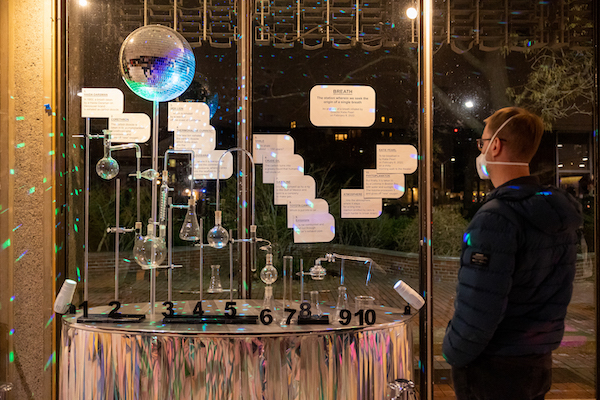Theater Review: “Ocean Filibuster” at A.R.T. — Surfing the Waves of Immersive Science and Art
By Mark Favermann
Ocean Filibuster draws on a marvelous fusion of myth, song, free verse, and science to explore why we are standing at the frightening edge of the cliff of our planet’s survival.
Ocean Filibuster, created by PearlDamour. Text by Lisa D’Amour. Music by Sxip Shirey. Directed by Katie Pearl. Featuring Jennifer Kidwell. Staged by the American Repertory Theater 64 Brattle Street, Cambridge. A digital version of Ocean Filibuster is available to stream on demand through March 27.

Jennifer Kidwell in the American Repertory Theater’s Ocean Filibuster. Photo: Maggie Hall
Theater at its best should enrich as well as entertain, and the American Repertory Theater’s Ocean Filibuster has the additional merit of taking the audience for a dip: this production dives beneath the waves. Visually, the design for this world premiere staging is spectacular and on occasion even visceral. But along with an immersive experience, the script takes an intimate, as well as critical, look at the relationship between humans and the ocean. The piece draws on a marvelous fusion of myth, song, free verse, and science to explore why we are standing at the frightening edge of the cliff of our planet’s survival.
The plot, a tense debate between Mr. Majority and the feminine Ocean itself/herself, takes off immediately. Both characters are played, impressively, by Obie Award–winner Jennifer Kidwell. The setting is a Senate chamber of some sort of global governing body. Mr. Majority introduces an “End of Ocean Bill” that is designed to shrink our planet’s oceans into a more manageable and marketable assemblage of inland seas. After his somewhat ponderous introductory presentation, the floor is opened for debate. The Ocean steps forward to speak in its own defense.

The interactive intermission of Ocean Filibuster at American Repertory Theater. Photo: Maggie Hall
From then on, humanity’s arbitrary and at times savage treatment of nature takes center stage via a verbal ping-pong match (with visual and musical accompaniment) between Mr. Majority and the Ocean. It is no holds barred: unfair rules and regulations, misunderstood science, devastating human waste, ecological abuse, and climate change. The Ocean conveys its case simply by talking about how hard it is just to keep going on.
Stagecraft is customarily a high point of any production at the A.R.T. Here, elegant lighting morphs into brilliant immersive animation and real-time video. The gorgeous environmental set is as vital a performer as any of the staging’s cast of actors/singers. It is the glorious creation of a gifted team that included scenic designer Jian Jung, lighting designer Thomas Dunn, and, most strategically, projection designer Tal Yardem. The costumes cleverly dramatize how plastics are devastating our oceans. The diaphanous sea creature outfits dreamed up by costume designer Olivera Gajic are particularly subtle. They can be seen wafting elegantly in shadow.

Jennifer Kidwell in Ocean Filibuster at the American Repertory Theater. Photo: Maggie Hall
Music is a strong component of Ocean Filibuster as well. The sound and music were created by music director Sxip Shirey, who collaborated with Lisa D’Amour on lyrics. D’Amour wrote the show’s text. The overall production design was managed with artistic finesse by Lisa McGinn. Director Katie Pearl took on the challenging chore of choreographing all of the production’s elements, generally using all at her command to underscore the drama of the narrative.
Magnificently switching back and forth between the roles of Mr. Majority and Ocean — on occasion even fusing the archetypes together — Kidwell gives a powerful performance, making maximum use of her charismatic presence. The rest of the cast members are terrific as well, their performances accented by their beautiful singing voices.
Between the two acts, there was an unusual intermission: it was part science fair, part sideshow, and part use of augmented reality. Audience members were encouraged to use a QR Code projected in the theater for access to augmented reality images that were located in the physical “islands” set up in the lobby. At the same time, performers were doing vignettes and songs on stage. The problem with this three-ring circus approach was that there was so much to see and hear that you were torn — paying attention to one thing meant that you would miss something else. Yet, the overabundance was all fun.
Though highly imaginative in conception and presentation, Ocean Filibuster will need improvements if it wants to make the journey to Broadway and beyond. Throughout the production, there is a push-pull between pedagogy and pageantry that quickly becomes strained. The rapid delivery of some performers made it difficult to follow the action, at times — audience members are sometimes left floundering in the Ocean’s waves. And the visual delights were often weighed down by too many technical explanations; the first act’s blasts of science speak and bureaucratic blah-blah were too heavy. For me, the first half is too long; it could use dramatic tightening. The second act was more theatrically fluid and infectious.
Since 1980, when the American Repertory Theater came to Cambridge, its mission has been to expand the boundaries of theater. The troupe’s focus has been on developing distinctive, in some cases groundbreaking, theatrical experiences. With its fusion of science and art, its state-of-the-art stagecraft, and its gender-bending performances, Ocean Filibuster carries on this tradition of not being traditional. This is an immersive musical theater experience that does more than entrance — it jars our consciences about what is happening to our environment. It is a testament to the show’s power that this debate is so difficult to shrug off.
An urban designer and public artist, Mark Favermann has been deeply involved in branding, enhancing, and making more accessible parts of cities, sports venues, and key institutions. Also an award-winning public artist, he creates functional public art as civic design. The designer of the renovated Coolidge Corner Theatre, he is design consultant to the Massachusetts Downtown Initiative Program and, since 2002, he has been a design consultant to the Red Sox. Writing about urbanism, architecture, design and fine arts, Mark is associate editor of Arts Fuse.
Tagged: Jennifer Kidwell i, Katie Pearl, Mark Favermann, Ocean Filibuster, PearlDamour
